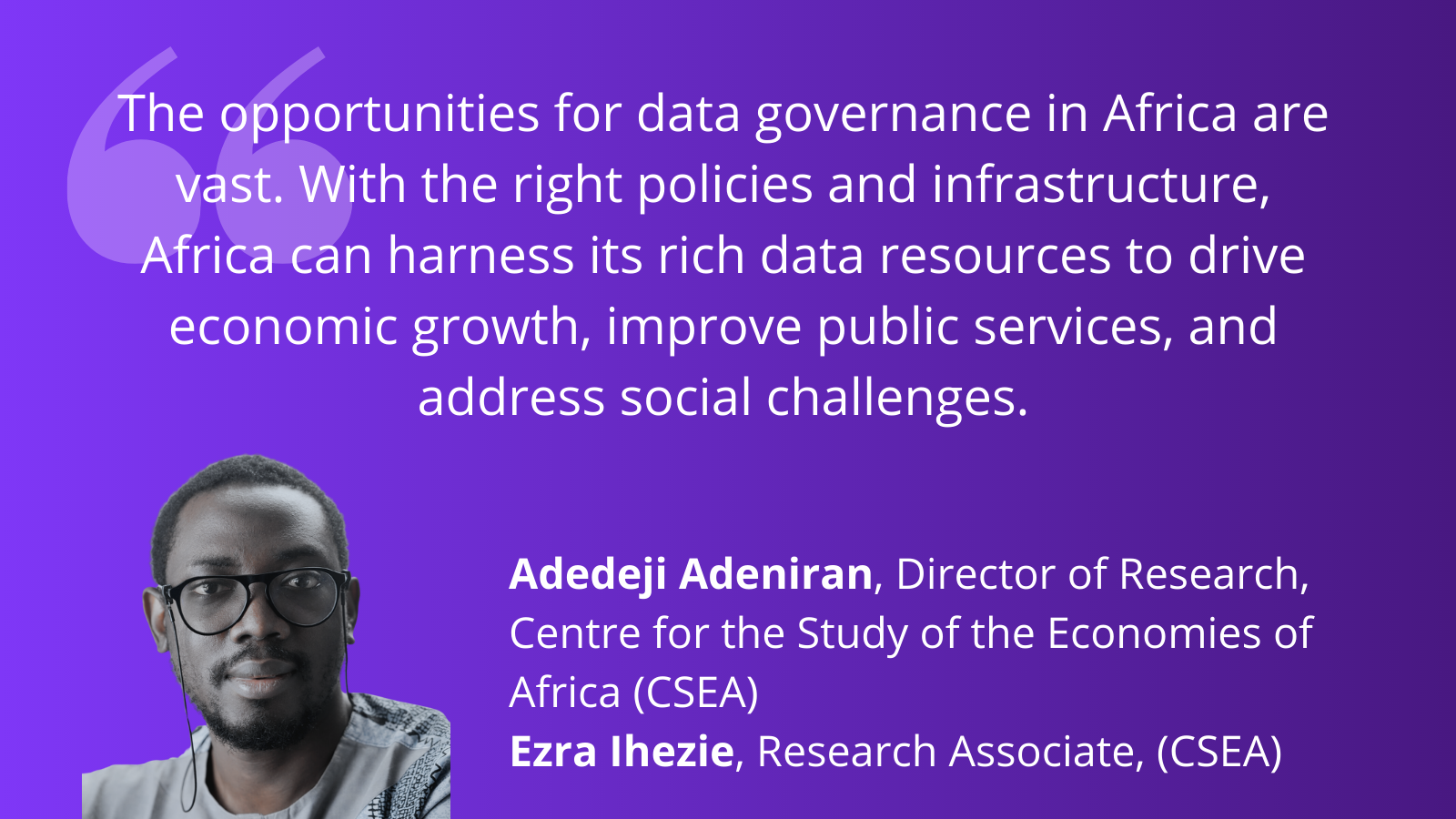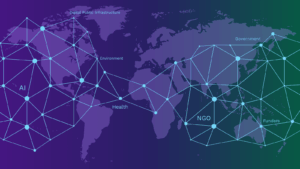Adedeji Adeniran Director of Research, and Ezra Ihezie, Research Associate, Centre for the Study of the Economies of Africa (CSEA).
In today’s digital age, data has become an invaluable asset, driving innovation, economic growth, and societal development. Africa, with its vast population and diverse landscapes, holds immense potential for leveraging data to transform various sectors. However, to harness the power of data effectively, responsible data governance is essential. This blog post explores the concept of responsibly unlocking the value of data for all, the evolving data governance efforts in Africa, and the potential of sandboxes in fostering cross-border data sharing.
Data Matters: How to Unlock its Potential Responsibly and Inclusively
Data is often metaphorically referred to as the new oil. Alluding to this comparison, responsible data governance entails the refinement of data (new crude oil) into value and innovations for society. Responsibly unlocking the value of data for all encompasses the establishment of an inclusive data ecosystem that benefits individuals, businesses, governments, and society. This concept underscores the importance of data governance frameworks that prioritize equitable access, protection, and ethical use of data. It emphasizes the promotion of privacy, security, transparency, and accountability within these frameworks. Additionally, it necessitates addressing issues of data inequality to ensure that marginalised communities have access to data-driven innovations. By creating such an ecosystem, we foster diversity, competition, innovation, and collaboration while leveraging data for positive purposes, all while acknowledging and mitigating the limitations and uncertainties inherent in data.
Evolving Data Governance in Africa: Opportunities and Challenges on the Horizon
Many African countries have recognized the importance of data governance and have initiated steps to develop comprehensive policies, legal frameworks, and institutions to govern data effectively. According to the UN Conference on Trade and Development1, there are 33 countries with data privacy legislation and additional countries with draft legislation. The African Union has also adopted the Convention on Cyber Security and Personal Data Protection in 2014, which provides a regional framework for harmonizing data protection laws and standards. Moreover, some regional economic communities such as ECOWAS and SADC have developed their own guidelines or model laws on data protection.
The opportunities for data governance in Africa are vast. With the right policies and infrastructure, Africa can harness its rich data resources to drive economic growth, improve public services, and address social challenges. Effective data governance can facilitate innovation, attract investments, and foster cross-sector collaborations. Furthermore, Africa’s growing tech and startup ecosystem can leverage data to create locally relevant solutions and drive entrepreneurship.
However, several challenges need to be addressed. One major challenge is the disconnect in the framing around data governance that separates the human rights approach from the pro-development approach. Embracing more linkages in data governance will be key to building broad partnerships and coordination around data governance. Additionally, issues such as data privacy, security, and the digital divide need to be addressed to ensure that data governance benefits all segments of society. Building robust infrastructure, enhancing data protection mechanisms, and fostering international collaborations are critical steps towards overcoming these challenges.
Harnessing the Power of Sandboxes Through Cross-Border Data-Sharing Solutions
Sandboxes, which are controlled environments for testing new technologies and data-sharing solutions, hold immense potential in Africa. They provide a safe space for experimentation, collaboration, and innovation. Sandboxes can play a crucial role in spurring new data-sharing solutions across borders by facilitating cross-sector partnerships, fostering trust, and ensuring compliance with data protection regulations.
By creating sandboxes specifically designed for data sharing, African countries can encourage data-driven collaborations between governments, businesses, research institutions, and civil society organizations. Sandboxes can enable stakeholders to explore innovative data-sharing models, develop best practices, and address challenges related to interoperability, data quality, and security. Moreover, sandboxes can serve as testbeds for emerging technologies like artificial intelligence and blockchain, allowing African countries to leapfrog in their data governance capabilities.
However, sandboxes are not a panacea for solving all data governance issues. Sandboxes need to be carefully designed and managed to ensure that they are ethical, legal, safe, and sustainable. Sandboxes need to have clear objectives, scope, criteria, rules, and oversight mechanisms. Sandboxes also need to involve diverse stakeholders such as regulators, policymakers, researchers, civil society, the private sector, and end-users in their design, implementation, evaluation, and scaling-up. Sandboxes need to balance innovation with protection by ensuring that they respect the rights and interests of data providers and users while addressing potential risks such as privacy breaches, security threats, or ethical dilemmas.
Connecting to CSEA’s Data Governance Work
Data governance is as much about human rights as it is about human development, with the two objectives complementary and reinforcing. CSEA’s own approach to data governance has emphasized on the importance of human rights, economic development, and regional framework. Better cross-border flow is critical to achieving these objectives and this shared characteristics with the idea around Sandboxes being pioneered in Africa by Datasphere. The African data governance space is not only being transformed by the increasing interest of the state actors but also through efforts of non-state actors (civil society, private sector, think tanks) that have helped set priorities, better understand the gaps and challenges and continue to provide better policy implementation at regional and national levels. The way forward is to deepen this shared relationship and enhance the commitment towards responsible data governance.
- Read more from other contributors in this blog series here
- The Datasphere Initiative has launched a complete online learning experience: “A Guide to Cross-Border Sandboxes for Data.” Enroll for the online course here.
Dr. Adeniran is the Director of Research at the Centre for the Study of the Economies of Africa (CSEA).
He holds a Ph.D. from the University of Witwatersrand, South Africa. He also holds a Master’s and Bachelor’s degree in Economics and Educational Management/Economics from the University of Ibadan.
He previously worked as a seasonal Lecturer in the Department of Witwatersrand, as a Data Analyst at the Analyst Data Services and Resources (ADSR), and as a Teaching Assistant at the Department of Economics University of Ibadan.
His research interests cut across macroeconomics, development finance, public economics policy analysis, and experimental economics.




